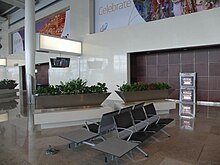This article needs additional citations for verification. (February 2024) |



A domestic airport is an airport that handles only flights within the same country.[1] Domestic airports do not have customs and immigration facilities and so cannot handle flights to or from a foreign airport.
These airports often have short runways sufficient to handle short or medium haul aircraft and regional air traffic. Security check/metal detectors are used in most countries, but in many cases they were installed decades after security checks for international flights had become commonplace.
Most municipal airports in Canada and the United States are of this classification. At international airports in Canada, there are domestic terminals that handle flights within Canada (flying from one Canadian city to another).
Additionally, some airports that are named "international" are essentially domestic airports that handles international traffic on an irregular basis. A notable example of this is Osaka International Airport (Itami Airport) in the outskirts of Osaka, Japan. Most of these airports are located in the United States.[citation needed]
In the United Kingdom, an example of a domestic airport is Wick Airport, which operates frequent flights to other Scottish airports.
Some small countries or regions do not have any public domestic airports, or even public domestic flights, due to their size or political reasons, or due to having alternatives to domestic flights such as high-speed rail (e.g. Belgium, Kuwait, Hungary, Lithuania, Luxembourg, Serbia, Singapore, Slovakia, and the United Arab Emirates).